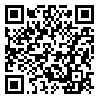Volume 9, Issue 3 (volume9, Issue 3 2021)
CPJ 2021, 9(3): 1-26 |
Back to browse issues page
Download citation:
BibTeX | RIS | EndNote | Medlars | ProCite | Reference Manager | RefWorks
Send citation to:



BibTeX | RIS | EndNote | Medlars | ProCite | Reference Manager | RefWorks
Send citation to:
Daneshvar S, Taghavi M R. Verbal and Visual Proactive Interference in Post-Traumatic Stress Disorder. CPJ 2021; 9 (3) : 17
URL: http://jcp.khu.ac.ir/article-1-3507-en.html
URL: http://jcp.khu.ac.ir/article-1-3507-en.html
Shiraz University , mtaghavi@rose.shirazu.ac.ir
Abstract: (6088 Views)
Objective: Working memory executive deficits have a role in maintaining Post-Traumatic Stress Disorder (PTSD) symptoms including flashbacks and reexperiencing. Accordingly, the aim of the present study was to compare the visual and verbal Proactive Interference in trauma-exposed individuals with and without PTSD.
Method: In this retrospective study, we recruited subjects through the purposive sampling method. We compared 30 survivors of road traffic accidents with PTSD with 30 trauma-exposed individuals without PTSD in terms of visual and verbal Proactive Interference. Measuring tools included the Post-Traumatic Stress Disorder semi-structured Interview for DSM-V, the Beck Depression Inventory-II and the Recent Probes Task. Data were analyzed using mixed repeated-measures analysis of variance (ANOVA) in SPSS-21 software.
Results: Subjects of the PTSD group reported higher levels of visual and verbal Proactive Interference than the control group. Moreover, patients with PTSD indicated higher deficiencies in visual working memory than verbal working memory.
Conclusion: Patients with PTSD show deficiencies in controlling proactive interference that should be taken into consideration through their treatment procedure.
Method: In this retrospective study, we recruited subjects through the purposive sampling method. We compared 30 survivors of road traffic accidents with PTSD with 30 trauma-exposed individuals without PTSD in terms of visual and verbal Proactive Interference. Measuring tools included the Post-Traumatic Stress Disorder semi-structured Interview for DSM-V, the Beck Depression Inventory-II and the Recent Probes Task. Data were analyzed using mixed repeated-measures analysis of variance (ANOVA) in SPSS-21 software.
Results: Subjects of the PTSD group reported higher levels of visual and verbal Proactive Interference than the control group. Moreover, patients with PTSD indicated higher deficiencies in visual working memory than verbal working memory.
Conclusion: Patients with PTSD show deficiencies in controlling proactive interference that should be taken into consideration through their treatment procedure.
Article number: 17
Type of Study: Research |
Subject:
Clinical Psychology
Received: 2021/10/23 | Accepted: 2022/06/21 | Published: 2022/06/21
Received: 2021/10/23 | Accepted: 2022/06/21 | Published: 2022/06/21
Send email to the article author
| Rights and permissions | |
 |
This work is licensed under a Creative Commons Attribution-NonCommercial 4.0 International License. |





